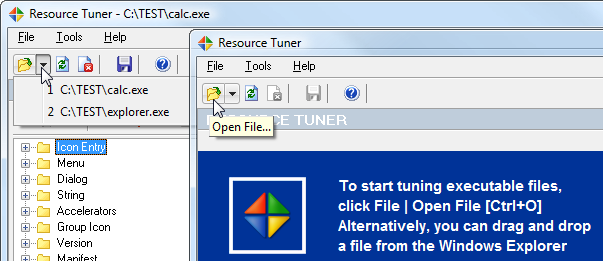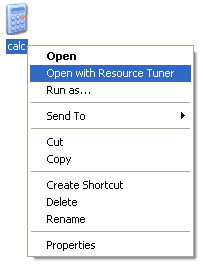How To Open an EXE/DLL File For Editing
Resource Tuner lets you open Windows executable files such as .EXE, .DLL, Device Drivers (.SYS), OCX Controls, and several others.
 Once inside, you can change the look of the icons, cursors, dialogs, buttons, sounds, animations and other elements of the Windows user interface by editing and replacing resources in the executable files.
Once inside, you can change the look of the icons, cursors, dialogs, buttons, sounds, animations and other elements of the Windows user interface by editing and replacing resources in the executable files.For more serious changes (though this may not do you any good unless you have a good understanding of programming functions), check outPE Explorer. For viewing and editing the raw binary data contents of the DLL file, use Hex Editor.
If your file is archived, use BitZipper. Unlike WinZip, it reads any compressed file types from A to Z and lets you extract, search and convert multiple archives in one single operation.
Most people asking how to open/edit .EXE or .DLL files are actually not really aware of what they are trying to deal with. EXE and DLL files are not plain, traditional text ASCII files that you can easily read and edit. You cannot simply open up an .EXE like a text file and start editing or reading the contents. Sometimes the only meaningful information inside DLL files is Vendor information (copyrights, trademarks, origins) and Product Version information. These binary files have a complex nested structure defined by the Portable Executable format, and they are not intended to be editable by users, neither are DLLs meant to be opened separately from the programs they belong to.
However, if you do want to change something in an EXE or DLL file for whatever reason, you may be able to do this by changing their resources with Resource Tuner. But still you will not be able to modify the actual code in any way: resources are separated from the program code. This way, you can make significant changes to the interface of the program while leaving the code untouched. You may also be able to translate the program interface into another language.
We Offer A Free Trial: Try The Software, Risk Free.
Minimum hardware requirements:
Intel Pentium® or AMD K5 processor with 166 MHz
16 MB RAM
Intel Pentium® or AMD K5 processor with 166 MHz
16 MB RAM
Open EXE/DLL File with Resource Tuner
Resource Tuner contains a number of methods for opening files. To open a file for browsing or editing resources, click the toolbutton to the left or click File > Open [CTRL+O]. The dropdown menu next to the toolbutton gives you quick access to recently open files. This list can be also accessed from the File > Recent Files menu option. The number of files in the list can be controlled from the Customize dialog.

You can open a file in Resource Tuner by right-clicking it in Windows Explorer and selecting Open with Resource Tuner from the context menu:
 Alternatively, you can drag and drop a file from the Windows Explorer onto the Resource Tuner icon or running Resource Tuner.
Alternatively, you can drag and drop a file from the Windows Explorer onto the Resource Tuner icon or running Resource Tuner.You can also open a file from the command line.
Usage: restuner.exe <filename>
Usage: restuner.exe <filename>
It is recommended to perform all file operations with copies of the originals and then only after you have moved the copies to a separate directory other than the parent or home directory of the executable.
The benefits are obvious and the not so obvious ones are OLE embedded executables then can still call some of their other DLLs or methods from DLLs in the parent directory.
The benefits are obvious and the not so obvious ones are OLE embedded executables then can still call some of their other DLLs or methods from DLLs in the parent directory.
Resource Tuner provides three functions that are automatically performed when opening a file: unpacking files compressed with UPX using the Plug-In subsystem, error checking, and precompiling resources.
If Opening a File Produces an Error
If opening a file produces an error, that file is most likely damaged, packed or compressed. To continue working with this file requires a more powerful tool, such as Heaventools PE Explorer.
1. Error: This file is likely damaged, packed or compressed.
There is a good chance the executable has been compressed to appear smaller. Since our software detects and unpacks only files compressed with UPX, you have to go through the trouble of manually unpacking this compressed exe before you can view or change it.
This is not viewed as a bug. We are not going to defeat the security attempts of other software authors. And we cannot support decompressing few hundred packers and protectors available on public.
2. Error: This is an NE Executable. Not supported!
Our software works with 32-bit PE files only. An NE (short for "New Executable") file is a 16-bit application intended to run on ancient Windows 3.xx. The other notable executable types that run on MS platforms are "MZ" (DOS), "NE" and "LE" - but those 16-bit formats are all obsolete.
We have no intention of supporting 16-bit files.
3. Error: This is NOT an EXE or DLL File
Resource Tuner does not care about a particular file extension whether your file is .exe, .dll or .txt. You can rename your file with any file extension or even leave it without an extension: when opening a file, Resource Tuner performs reading and analyzing of the file header within the file.
With all of that being said, if Resource Tuner says your file is NOT a dll file, this is a naked truth. Don't let extensions trick you.
IF YOU WANT TO VIEW AND EDIT THE RAW DATA CONTENTS OF A FILE:
Then you need a binary hex editor: FlexHex editor. Use it for inspecting binary output, editing the raw data contents of a file, examining the structure of proprietary closed-format data files or old data in unknown formats, quick fixing executable or data files, creating binary files for test runs, and more.










